Summary
- Play as Oirat Horde to trigger the Tumu Crisis and exploit Ming’s weakness for territorial gain, power vacuum, and colonization opportunities.
- Muscovy with Domination DLC offers a vassal swarm advantage and Mission Tree for strategic expansion into Eastern Europe and Russia formation.
- Timurids provide an excellent learning experience in diplomacy, subject management, and strategizing to handle potential rebellions and rival nations.
Players aiming to recreate or forge new histories in grand strategy games may appreciate the depth Europa Universalis 4 offers, especially with its near-400-year coverage that allows players to see their chosen countries blossom into their current states at the beginning of the 19th Century, or find ways to restore extinct empires to their former glory.

Related
13 Best Grand Strategy Games For Building Fictional Empires
These grand strategy games provide the ultimate power fantasy for players who wish to build their very own fictional empires.
While Europa Universalis 4 allows players to play as any nation existing in 1444, certain countries become ideal for newcomers due to their ideal starting position. Moreover, certain countries allow beginners to EU4 to learn both the game’s core and advanced mechanics, as well as enjoy its more intricate systems.
Updated on January 15, 2025, by Rhenn Taguiam: While fans still wait with bated breath for any updates about Europa Universalis 5 or another DLC for Europa Universalis 4, gamers can still rely on the latter to provide them with a riveting grand strategy experience. And although the game can seem overwhelming for newcomers, there are actually countries in EU4 that can make the learning curve more tolerable for players. Some options include the strongest among the Hordes, a decent nation upgraded by a DLC, and another country with strong ties to France and other countries in Europe.
18
Oirat Horde
Pushing Into Ming Teaches Scaling, Combat Readiness
|
Primary Culture |
Oirat (Altaic) |
|---|---|
|
Capital Province |
Kobdo |
|
Government |
Steppe Nomads |
|
State Religion |
Tengri |
|
Technology Group |
Nomadic |
Considered the strongest among the Hordes, the Oirat Horde is known not just for its more powerful version of Horde Ideas (such as cavalry bonuses) but also for bordering the Celestial Empire of Ming – arguably one of the world’s largest nations at the time, yes, but also beginning the game with quite the fragile disposition. Players should ideally trigger the Tumu Crisis by capturing the Ming Emperor, something they could do by provoking Ming. This can be done by accepting China’s offer to become a tributary but never pay until Ming attacks the player – a move that ensures players have allies to support them in the war. This shouldn’t be too difficult to pull off because of Oirat Horde’s cavalry bonuses and decent army.
Capturing the Ming Emperor opens the Empire to a large power vacuum, which players can take advantage of. Taking Beijing can open up players to a peace deal, and they can abuse it to take as much land as possible, potentially bankrupting Ming and opening the region for colonization. Playing as the Oirat Horde will teach players how to time their battles properly and take territory more tactically, especially when focusing too much on capturing China will likely leave players open to attacks on their turf.
17
Muscovy
Turning Into Russia Turns It Into A Superpower
|
Primary Culture |
Muscovite (East Slavic) |
|---|---|
|
Capital Province |
Moskva |
|
Government |
Russian Principality |
|
State Religion |
Orthodox |
|
Technology Group |
Eastern |
With the Domination DLC, Muscovy has become a pretty decent starting nation with National Ideas and a Mission Tree designed to help it achieve greater control over its isolated place in Europe without the hassle of competing with other colonialists. It begins with five vassal nations, which gives players quite the opening to vassal swarm their way into early-game dominance – especially with the DLC as mentioned above, giving Muscovy quite a lot of claims that extend over Eastern Europe.
A religious start unlocks the Orthodox Church and incentivizes religious-empowered conquests, while a military opening incentivizes brute-force colonization. In speaking of conquest, Muscovy going into Russia is a viable move to help players learn more about colonization in the game – especially larger areas. Unlocking Russia also unlocks the Siberian Frontier, a unique mechanic that turns an empty province into a Siberian Frontier colony provided it has a path (directly or through empty provinces) to its capital.
16
Timurids
Control The Rebellious Children, Control The World
|
Primary Culture |
Uzbek (Alatic) |
|---|---|
|
Capital Province |
Herat |
|
Government |
Iqta |
|
State Religion |
Sunni |
|
Technology Group |
Muslim |
The Timurids will begin with five (5) subjects (Transoxiana, Sistan, Khorasan, Fars, Afghanistan) at a constant threat of rebelling – something players can alleviate by focusing on their Taxation Policy, giving strong Duchies to the Amirs, and conducting Royal Marriages. This is essential when obtaining cores from nearby Ajam, which players are recommended to wage war on as soon as possible before the Timurids’ starting leader dies. As Timurids will train players to be able to handle their subjects being wishy-washy in terms of their loyalty, its potential for the rest of the game may help them even contend with powerhouses like the Ottomans in terms of performance.
It’s important players learn how to ensure their subjects don’t rebel, as the nation can become a Europa Universalis 4 powerhouse given its decent stats and strategic geographic placement. Diplomacy-wise, Timurids can make powerful allies out of Moghulistan, France, and the Commonwealth to secure support in wars while temporary relationships with the Ottomans and Jaunpur or Gujarat are ideal at the start before breaking them off at any point when players want to conquer their lands for their own. Trade-wise, Timurids are in a position to control trade in Samarkand, especially if they control Persia.
15
Naples
Independence Is Key To Capitalize Potential
|
Primary Culture |
Neapolitan (Latin) |
|---|---|
|
Capital Province |
Napoli |
|
Government |
Feudal Nobility |
|
State Religion |
Catholic |
|
Technology Group |
Western |
At the beginning of a Europa Universalis 4 experience, it’s suggested Naples develop its relationships with France and other neighboring nations in order to get allies when they declare independence against Aragon. After its independence, Naples can expand its opportunities depending on its goals. For instance, Naples can set their sites to Europe via the Sea or into India to start an Asian or African colonization. The Ottomans stay as a deadly adversary, which means allying with the likes of the Papal State or other Holy Roman Empire nations could be an ideal defensive strategy.
Despite its size, Naples has the potential to snowball into a worldwide power assuming it can focus on coring relevant provinces and acquiring monuments – positions it enjoys given its proximity to Europe and the rest of Africa. Starting the match with cores on Sicily and Malta can give Naples a decent advantage in terms of Development, something they can take advantage of for early-game progression. Naples should focus on getting monuments in nearby territories, especially when its capital Napoli has the Royal Palace of Caserta that can give +100 Governing Capacity. Nearby monuments of focus include the Parthenon (in Athens), the Santa Maria del Flore (Firenze), and the Pyramid of Cheops (in Cairo), which when combined can help players get Advisors for insanely cheap amounts as early as ~1500.
14
Brandenburg
Learn Nation-Building Mechanics For Expanded Gameplay
|
Primary Culture |
Saxon (Germanic) |
|---|---|
|
Capital Province |
Berlin |
|
Government |
Feudal Nobility |
|
State Religion |
Catholic |
|
Technology Group |
Western |
Players who want to analyze nation-building in their Europa Universalis 4 gameplay could start this journey with Brandenburg. While Brandenburg can lead to flexible playthroughs, it’s dependent on an alliance with Poland for convenient starting assistance. From here, players can approach the game in a variety of ways. Going for the slow burn means hitting Stettin with allies (Mecklenburg, Hesse, and Austria) before expanding into Wolgast after Poland’s war with the Teutonic Order. Alternatively, Brandenburg can get aggressive and vassalize Saxony as soon as possible and wait for the opportunity to buy Neumark from the Teutonic Order.
Both strategies make it ideal to expand Denmark to the Northand into Novgorod to form Germany or Prussia. Alternatively, players of the grand strategy game can follow Brandenburg’s mission tree, where they should guarantee Anhalt for another personal union, claim the Ansbach throne, and rival smaller nations within the Holy Roman Empire to block any chances of them allying with stronger countries. Come December 1444, players can declare humiliate wars and win against Luneburg, Mecklenburg, and other smaller nations for Monarch Points. This should hasten the development of the Renaissance, which should make other objectives easier to pursue.
13
Sweden
Flexible Nation For Various Playstyles
|
Primary Culture |
Swedish (Nordic) |
|---|---|
|
Capital Province |
Stockholm |
|
Government |
Feudal Nobility |
|
State Religion |
Catholic |
|
Technology Group |
Western |
Players who appreciate a decent challenge with a flexible starting nation can learn the game’s more complex mechanics through Sweden. Granted, Sweden demands slight urgency in dealing with its more aggressive neighbors. However, its solid foundation of a decent army, National Ideas, and mission tree can open up a fun playthrough for players who eventually get their rhythm.
As Sweden, players should ideally gain independence from Denmark as soon as possible. This positions them as Denmark’s rivals and slowly becomes a force to reckon with. Given the right circumstances, Sweden should have wiggle room to conquer Poland and/or Muscovy before they become threats (as the Commonwealth and Russia, respectively), usually by allying with one to wage war on the other. Expanding into Germany may require releasing Finland and other provinces to join the Holy Roman Empire and avoid incurring the Emperor’s wrath, although a sufficiently powerful Sweden could aim to become the Emperor themselves.
12
Cologne
Learn To Adapt To Being Part Of The Holy Roman Empire
|
Primary Culture |
Rhenish (Germanic) |
|---|---|
|
Capital Province |
Koln |
|
Government |
Clerical State |
|
State Religion |
Catholic |
|
Technology Group |
Western |
As part of the Holy Roman Empire with the Kingdom Rank, Cologne enjoys having powerful allies at the onset of the grand strategy game. Its convenient access to the English Channel can slowly build Cologne into a powerhouse, with the Emperor’s backing giving them room to play offense and rely on imperial assistance on defense.
It’s ideal for Cologne starts to focus on religion to maximize their potential in the mid-game. Cologne should ally Mainz and Trier and expand into territories needed for their missions before the Reformation. It’s also ideal for Cologne to focus on gaining Devotion through the Diet and get an heir who focuses on Papal Influence. Should Cologne successfully switch cultures to Dutch and from the Netherlands, their position as an electorate can guarantee the maintenance of their allegiance to the Empire.
11
England
Powerhouse Status Gives Players Wiggle Room For Experimentation
|
Primary Culture |
English (British) |
|---|---|
|
Capital Province |
London |
|
Government |
English Monarchy |
|
State Religion |
Catholic |
|
Technology Group |
Western |
Players who want to go big at the onset of their 4X experience should consider England. Due to its starting position, players can pursue their missions and objectives without worrying much about the rest of the continent. Their proximity to the English Channel, arguably the game’s best Trade Node, allows England to reap economic benefits faster. In this regard, England could form Great Britain and secure global dominance by slowly colonizing both Americas.
This dominance is especially present in the early game, as England’s starting position as an isolated island allows it to reign supreme in the seas – especially with the game’s bad AI when it comes to naval battles. England’s position allowed it to create allies quickly, making much of its missions up to the formation of colonial Great Britain much easier to accomplish should players know what they were doing.
10
Japan (Daimyo)
A Mini Game To Explore Extremes
|
Primary Culture |
Togoku (Japanese) |
|---|---|
|
Capital Province |
Kyoto |
|
Government |
Shogunate |
|
State Religion |
Shinto |
|
Technology Group |
Chinese |
Unlike other nations, starting as Japan in Europa Universalis 4 plunges them straight into the Warring States period. This puts them in charge of a Daimyo whose main goal is unifying Japan by defeating other Daimyo and securing control over Kyoto. It’s only after doing this that players can expand their horizons outside the Land of the Rising Sun, which means accomplishing this should be their main priority.
In turn, playing Japan encourages newcomers to find ways of optimizing their colonization approach on a smaller scale, with more complex game principles such as hyper-optimization through the right Daimyo choice, deliberate loans, and forced bankruptcy also being viable options when expanding beyond Japan. After unifying the Shogunate, players can fight the weaker Korea to access their navy. Players may make an alliance with the Ming or wait for European explorers, with either option expanding Japan’s interests in either the East or the West, respectively.
9
Korea
Setback Leads To Flexibility
|
Primary Culture |
Korean (Korean) |
|---|---|
|
Capital Province |
Hanseong |
|
Government |
Hermit Kingdom |
|
State Religion |
Confucian |
|
Technology Group |
Chinese |
Using Korea will teach newcomers to Europa Universalis 4 gameplay to work their way around unique cultural setbacks while at the same time capitalizing on Korea’s own cultural flexibility. Thanks to the nation’s strong starting leader, players can remove disadvantages such as wartime stability hits, internal unrest, and literary purges by completing specific Missions. Interestingly enough, the completion of said Missions should slowly set up Korea for more diverse plays.
Developing its provinces to Level 6 opens opportunities for Korea to form both Manchu and Japan depending on the player’s progress. Instead of choosing one or the other, players can “min-max” by forming into Manchu and then switching to Japanese culture to form Japan and acquire the nation’s ideas. Afterward, they can switch back to Manchu to secure the Chinese cultural union. Alternatively, players can simply focus on eliminating Japan and Ming to secure their trade routes, as their expansion can hinder Korea’s growth.
8
Vijayanagar
Positioned Perfectly To Create An Empire
|
Primary Culture |
Kannada (Dravidian) |
|---|---|
|
Capital Province |
Vijayanagar |
|
Government |
Nayankara System |
|
State Religion |
Hindu |
|
Technology Group |
Indian |
The status of Vijayanagar as India’s strongest Hindu nation is only hampered by its rival Bahmanis Sultanate to the north, although weaker nations surrounding the City of Victory should be ripe for the taking in the eventual creation of the Empire of Bharat. Its decent starting position and a more apparent rival in the form of Bahmanis, as well as Bengal or Orissa, allows players to know immediately which nations to stay wary of.
The main goal of players in the early game was to remove Bahmanis, which they could do by first securing Malwa as an ally and slowly annexing territories in Malabar. When players reach their Force limit, they can declare war on Bahmanis with backup after promising lands to the Malwa and breaking the allegiances between Bahmanis and its allies. Succeeding on this route gets Vijayanagar’s largest rival out of the way, opening more doors for a more aggressive experience similar to the Ottomans.
7
Ayutthaya
Lack Of Strong Neighbors Opens Expansion
|
Primary Culture |
Siamese (Tai) |
|---|---|
|
Capital Province |
Ayutthaya |
|
Government |
Mandala System |
|
State Religion |
Theravada |
|
Technology Group |
Chinese |
Situated in Southeast Asia, Ayutthaya was the region’s major power despite its beginnings as a tributary to the Chinese Ming in 1444. While Ayutthaya begins with potential wars against the Khmer Empire and its Burmese neighbors, vassals via the northern Sukhothai and southern Ligor can give players allies at the onset.

Related
Best Grand Strategy Games For Building Empires From Scratch
Gamers who enjoy the sense of accomplishment that comes from forging an empire from scratch will find much to love in these grand strategy games.
Thanks to their status as a Ming tributary, Ayutthaya always has allies against aggressive India or even European powers. This layer of protection gives Ayutthaya the advantage of time to bolster its forces, first by conquering Khmer and then Lan Xang as well as Dai Viet. Despite its relative strength, Ayutthaya’s position in Southeast Asia can make resupplies much harder, discouraging careless wars in favor of tactical attrition efforts.
6
Austria
Dominate Diplomacy Early With The Roman Empire
|
Primary Culture |
Austrian (Germanic) |
|---|---|
|
Capital Province |
Wien |
|
Government |
Austrian Archduchy |
|
State Religion |
Catholic |
|
Technology Group |
Western |
Players who start their Europa Universalis 4 journey as Austria begin with a larger responsibility: making history as Emperor of the Holy Roman Empire. Its location in Central Europe, and being surrounded by various other nations, offers players the unique experience of domination through diplomacy. Thanks to Austria possessing more Diplomats and Relationship Slots as Emperor, Personal Unions could be the nation’s saving grace against brewing military powers such as the Ottomans.
Austria’s missions offering Personal Union Casus Bellis to its neighboring nations also encourage players to time their war efforts. For instance, fighting similarly-sized Bohemia may be a matter of who can get the most mercenaries. Afterward, improving relationships with the nation could transform them into allies in the player’s PU CB versus Hungary and Milan.
5
Kilwa
Start Strong To Prepare For Later Challenges
|
Primary Culture |
Swahili (East Bantu) |
|---|---|
|
Capital Province |
Kilwa |
|
Government |
Eastern Plutocracy |
|
State Religion |
Sunni |
|
Technology Group |
East African |
Instead of starting in classic Europe, players in their first Europa Universalis 4 playthrough may enjoy their first campaign as Kilwa. Positioned in East Africa, Kilwa starts in a favorable position along the Swahili Coast and begins the game with better access to tech compared to its counterparts. Due to the relative distance of potential enemies from Europe, Kilwa players should have time to improve the country’s overall territory and resources.
Theoretically, players can stabilize their economy by securing all gold mines within South Africa while strengthening their overall presence through buffs provided by Missions. Whereas Europe will likely expand into Africa, Kilwa should instead focus on colonizing Southeast Asia and trading with the rest of the continent. Timing will be key with Kilwa, as future expeditions from Portugal, Spain, and the Ottomans will position them as threats to the player’s expansion.
4
Portugal
Dominate The Game With Trade
|
Primary Culture |
Portuguese (Iberian) |
|---|---|
|
Capital Province |
Lisboa |
|
Government |
Portuguese Monarchy |
|
State Religion |
Catholic |
|
Technology Group |
Western |
With neighboring Castile busy with its Reconquista, Portugal is left to ponder its potential to expand its borders. Courtesy of Henry the Navigator, Portugal has become a powerhouse in both shipbuilding and navigation, making the country perfect for exploration and trade-centric runs away from typical Europa Universalis 4 gameplay that explores more interpoliticking. For more peaceful playthroughs, players can ally with England for their mission and join forces with Castile to avoid being in the crossfire of their own colonization efforts.
6:16

Related
10 Grand Strategy Games For Mastering Warfare Tactics
These grand strategy games are ideal for players eager to learn the art of strategic warfare.
In this manner, players can learn the ropes of creating expeditions towards sought-after Morocco and high-development African provinces to get ahead of the pack in terms of exploration. More aggressive plays may involve allying with Aragon instead to oppose Castile, stopping it from forming Spain in a bid to prevent its rise as Portugal’s competitor for colonization.
3
Castile
Train Nation-Building With The Reconquista
|
Primary Culture |
Castilian (Iberian) |
|---|---|
|
Capital Province |
Toledo |
|
Government |
Feudal Nobility |
|
State Religion |
Catholic |
|
Technology Group |
Western |
Ever determined to finish the Reconquista and unite the Iberian Peninsula, playing Castile in this grand strategy game becomes the player’s best exercise in annexation for the purposes of country creation. While modern-day countries can be created in Europa Universalis 4, the formation of Spain is a part of Castile’s national Missions that actively reward players upon the completion of its mission trees.
Unlike other nation-building playthroughs, Castile makes it much easier for players to accomplish their Iberian ambition by starting the game mid-Reconquista. This ensures Castile already has a large army to begin with, as well as a trade node via Sevilla from which it can extend its market influence. Among the best opening moves for Castile would be befriending Portugal, unlocking Exploration Ideas, and beginning the Reconquista anew by conquering Navarra before expanding into Granada and North Africa.
2
Ottomans
Headstart Encourages Early-Game Domination
|
Primary Culture |
Turkish (Levantine) |
|---|---|
|
Capital Province |
Edirne |
|
Government |
Ottoman Government |
|
State Religion |
Sunni |
|
Technology Group |
Anatolian |
Courtesy of the leadership of Mehmed II, the Ottomans in a player’s Europa Universalis 4 playthrough is at the crux of a milestone. Should he succeed in conquering Byzantium, he can become history’s Mehmed the Conqueror, who can extend his reach to Anatolia, the Balkans, and even the Mamluk of Egypt and Syria. Gameplay-wise, the Ottomans start any EU4 game possessing decent earnings and an advanced military capable of going toe-to-toe with potential rivals.
Waiting for the “Crusade of Varna” to pass gives the Casus Belli to declare war on Byzantium, which players can do at the onset to claim Constantinople, a valuable trade node. Players opting for aggressive plays will appreciate the Ottomans’ early military advantage, encouraging them to go all out in aggressive expansion towards nearby countries.
1
France
Experience All Major Mechanics In The Game
|
Primary Culture |
Francien (French) |
|---|---|
|
Capital Province |
Paris |
|
Government |
French Feudalism |
|
State Religion |
Catholic |
|
Technology Group |
Western |
The truce after the Hundred Years War has given France a much-needed reprieve from its deadly battle with England, leaving players open to enjoying their Europa Universalis 4 gameplay with the Kingdom of France prepared to rebuild its power. This flexibility opens France as one of the player’s best options to start the game, especially since it tackles most (if not all) major mechanics the game has to offer: conquest and reconquests, vassalization, personal unions, aggressive expansion, and colonialism.
France should consider attacking England due to their possession of a stronger infantry, while allying with Scotland bypasses England’s navy via land access, and allying with Castile handles any Portuguese reinforcement. Post-war France is encouraged to pursue French culture group nations, as conquering them lessens aggression expansion impact. Should players have enough firepower to take on Byzantium, France may be able to construct a quick Roman Empire.

- Released
-
August 13, 2013
- ESRB
-
T For Teen due to Drug Reference, Mild Language, Mild Sexual Themes, Mild Violence
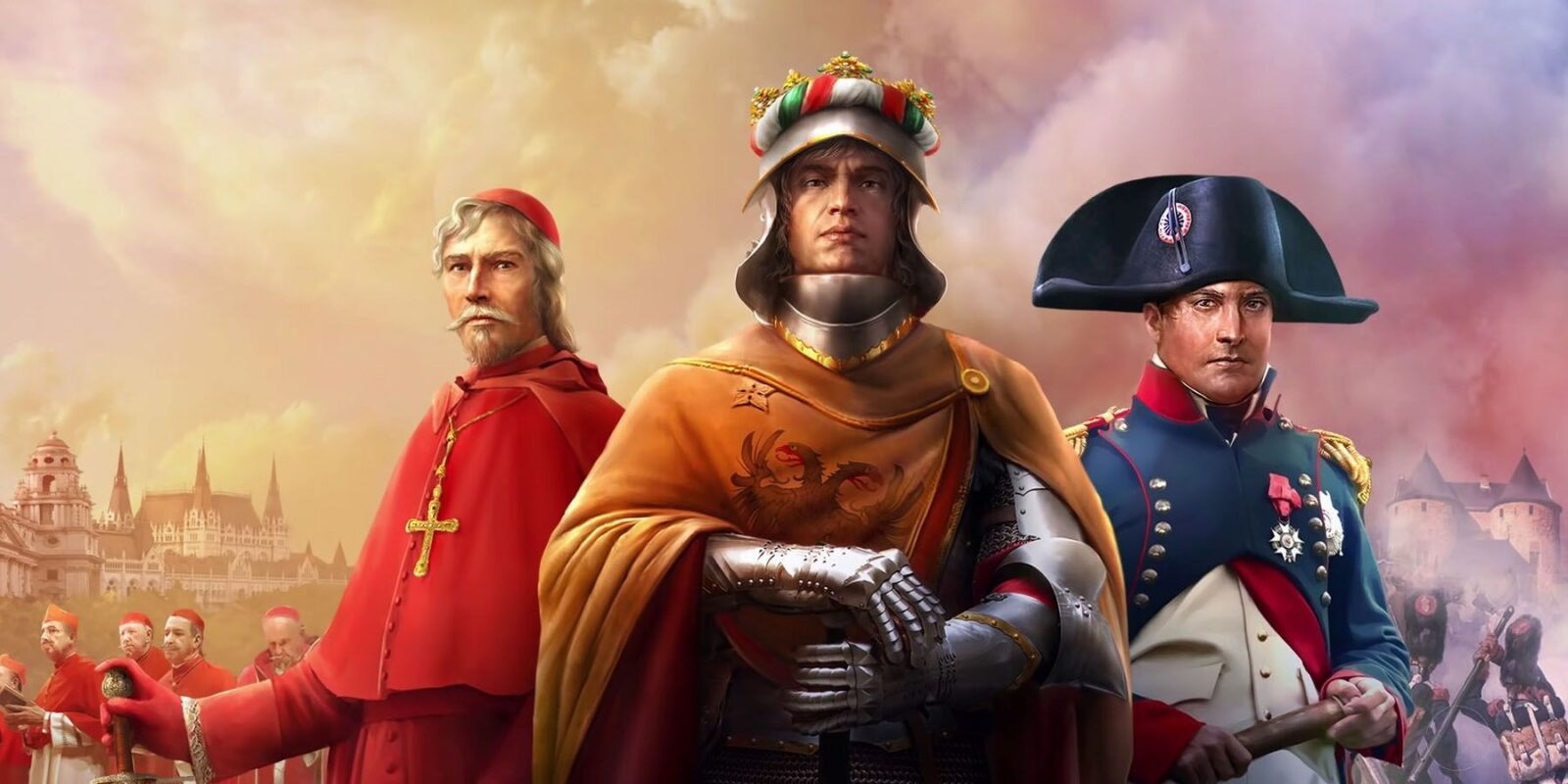

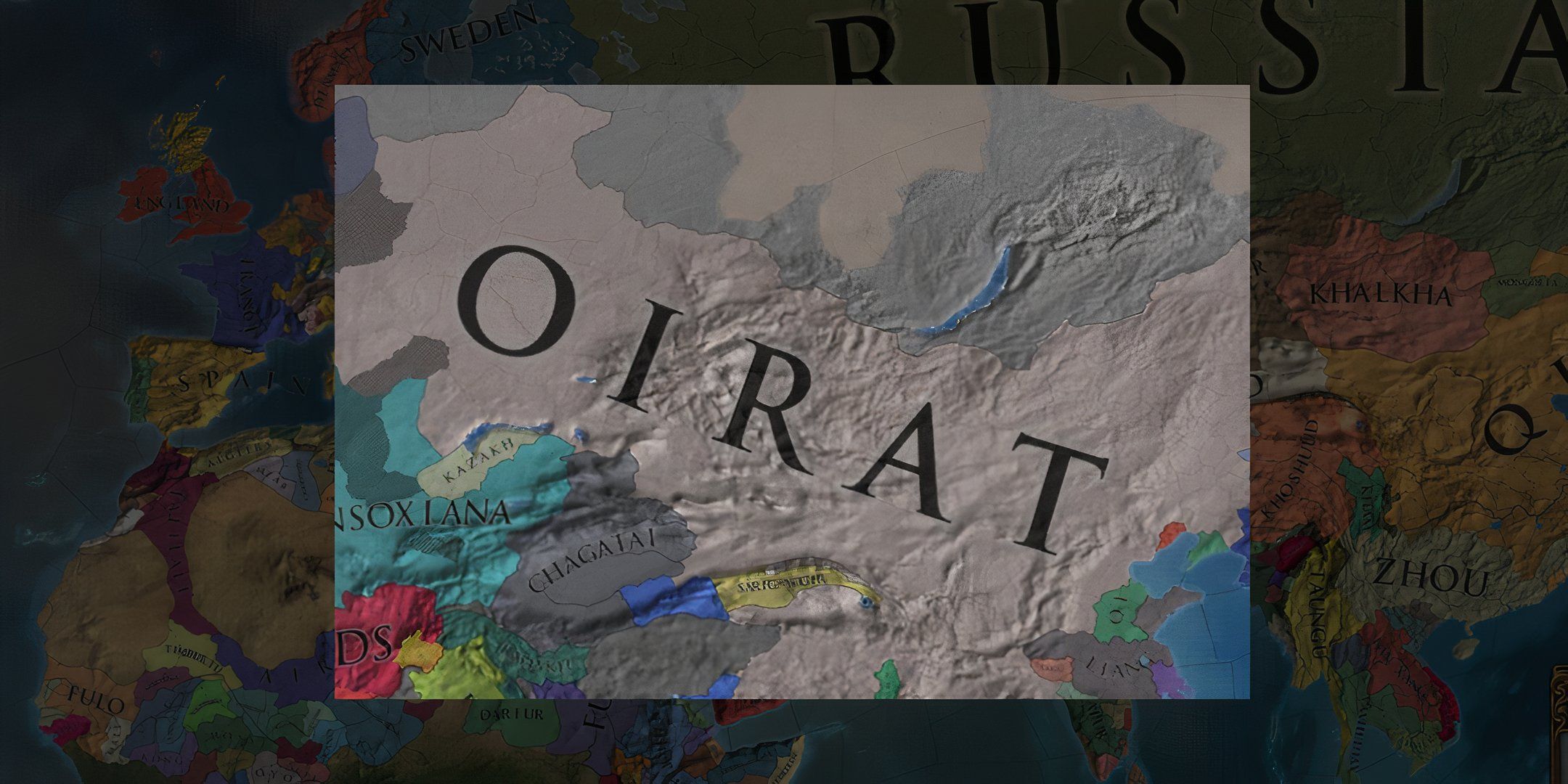
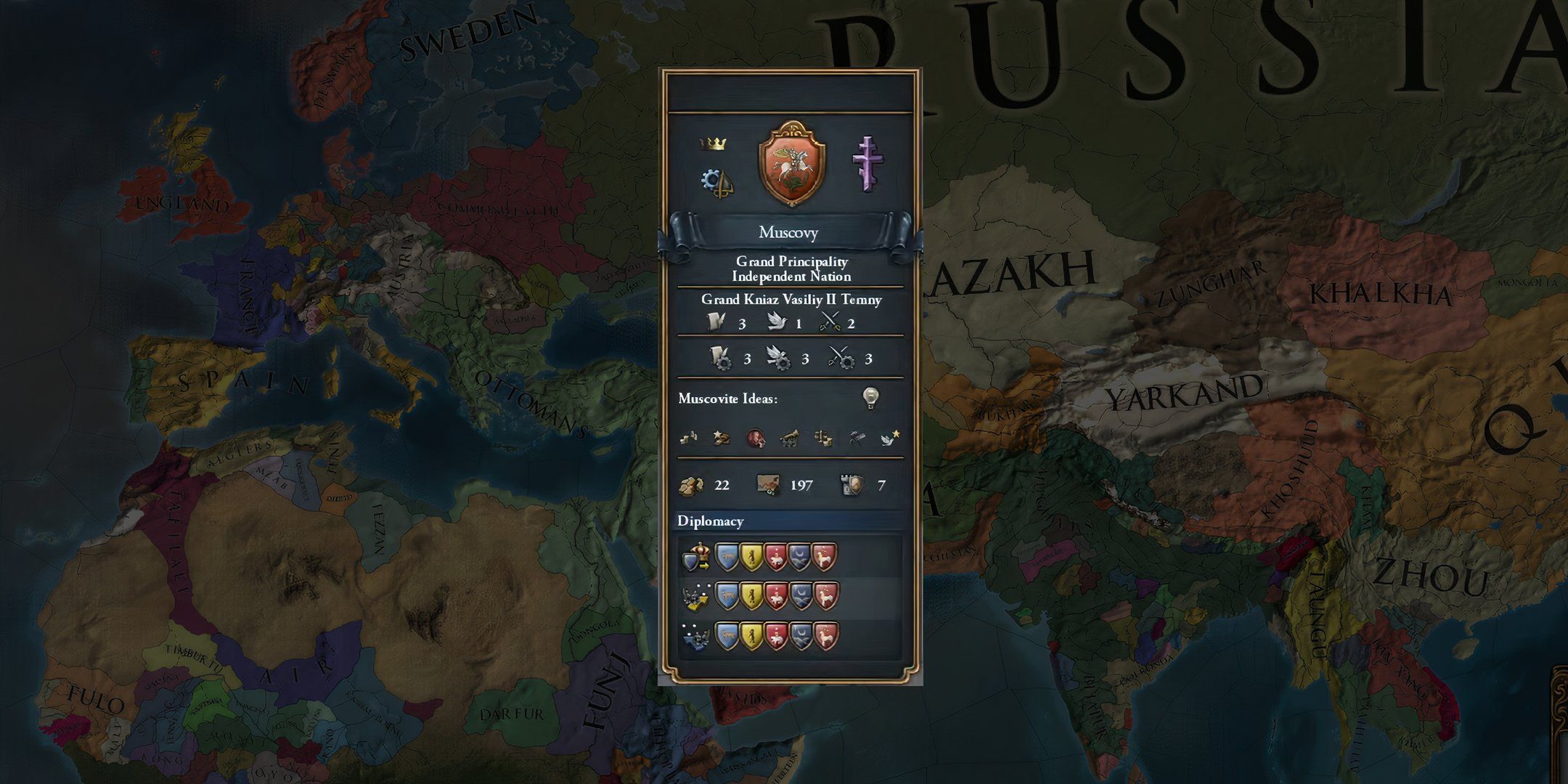
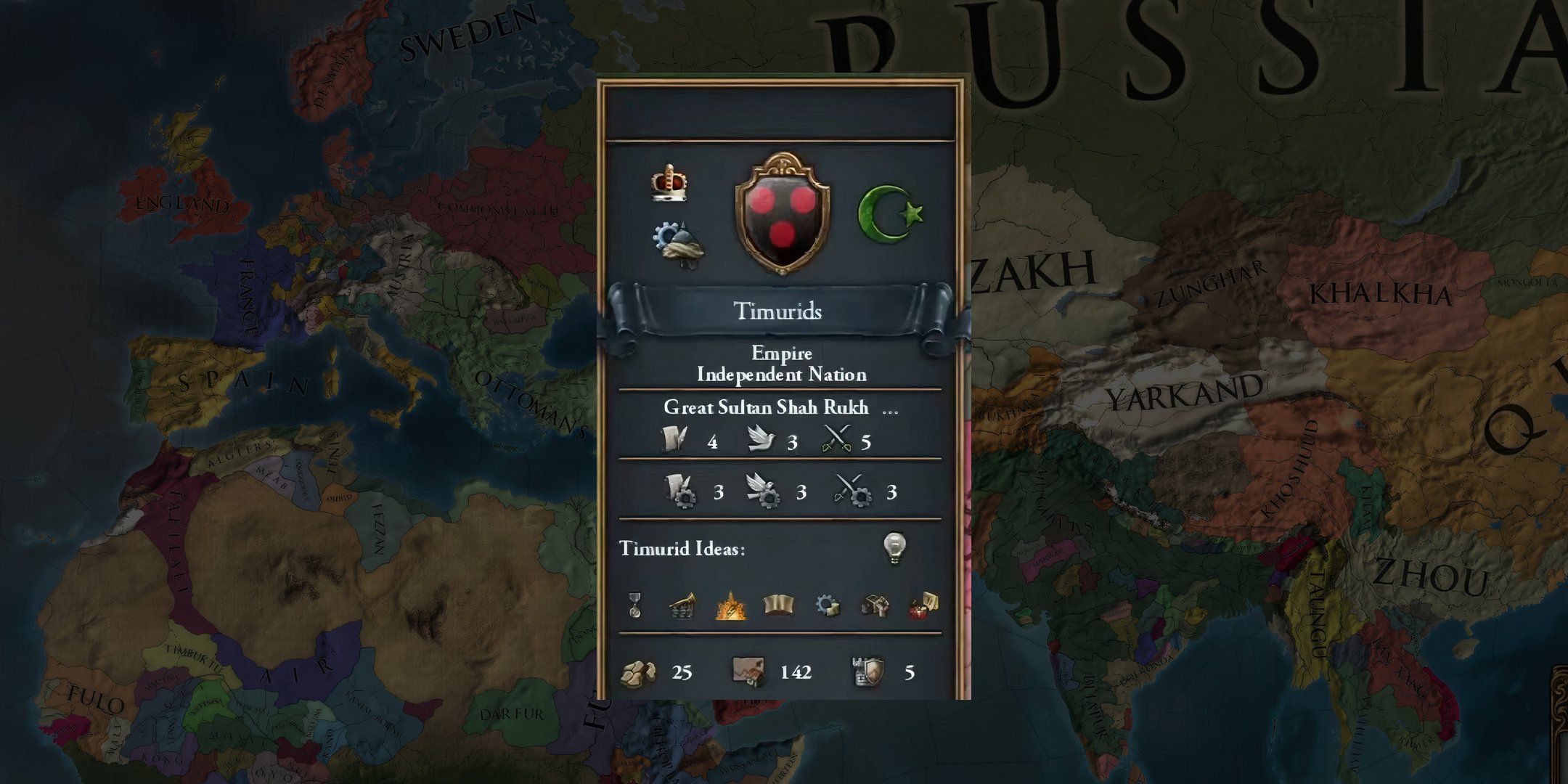
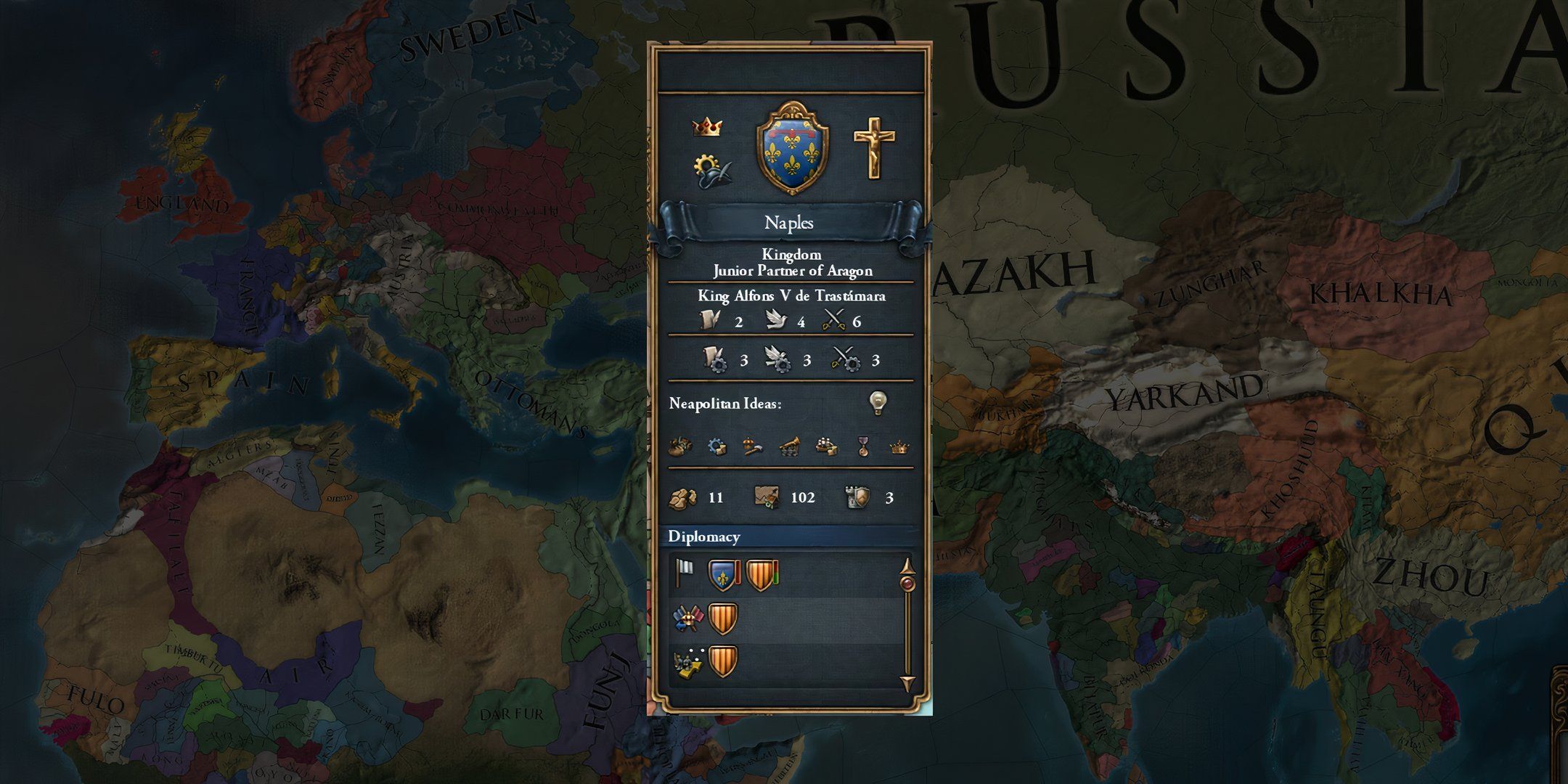
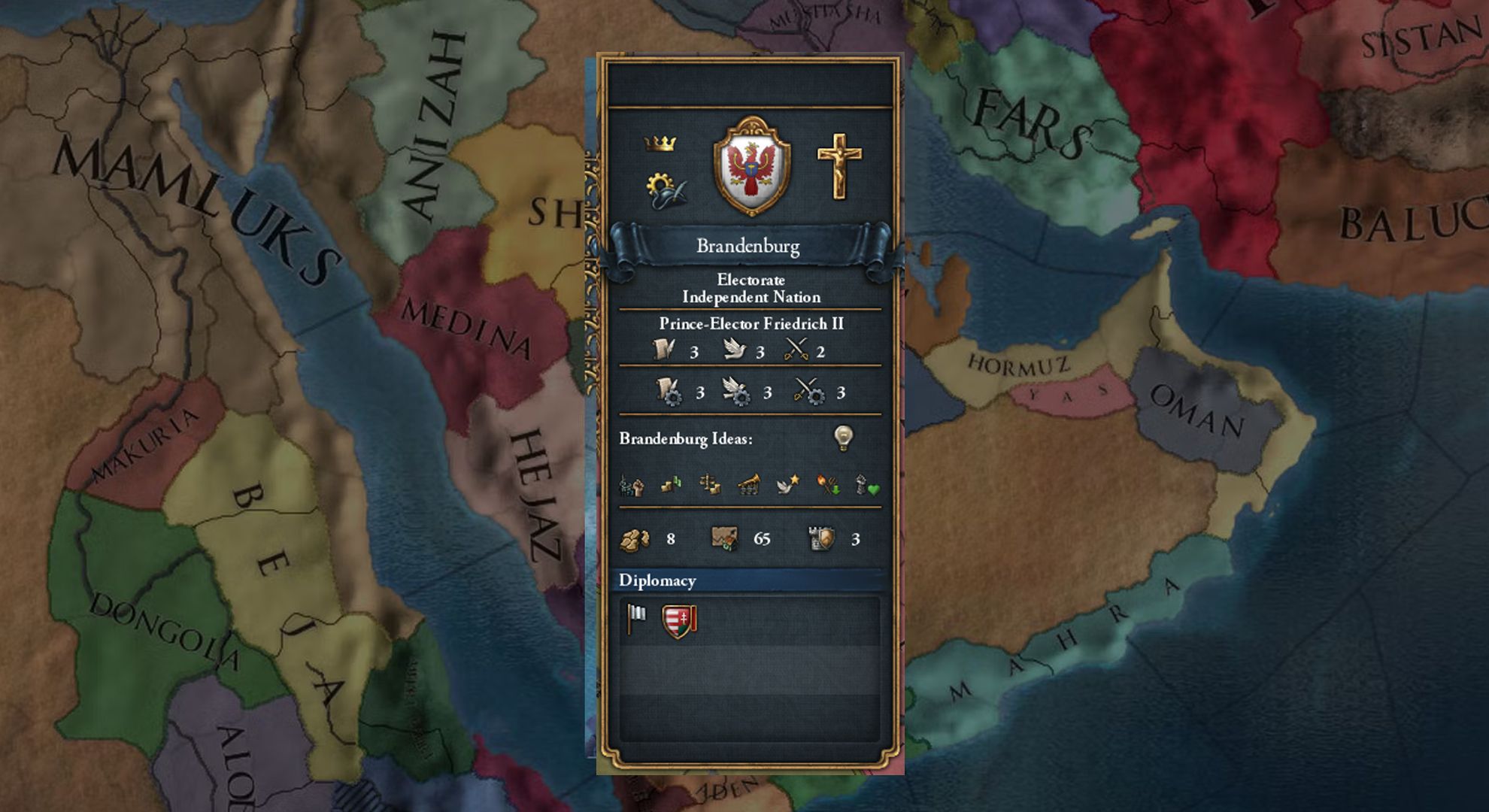
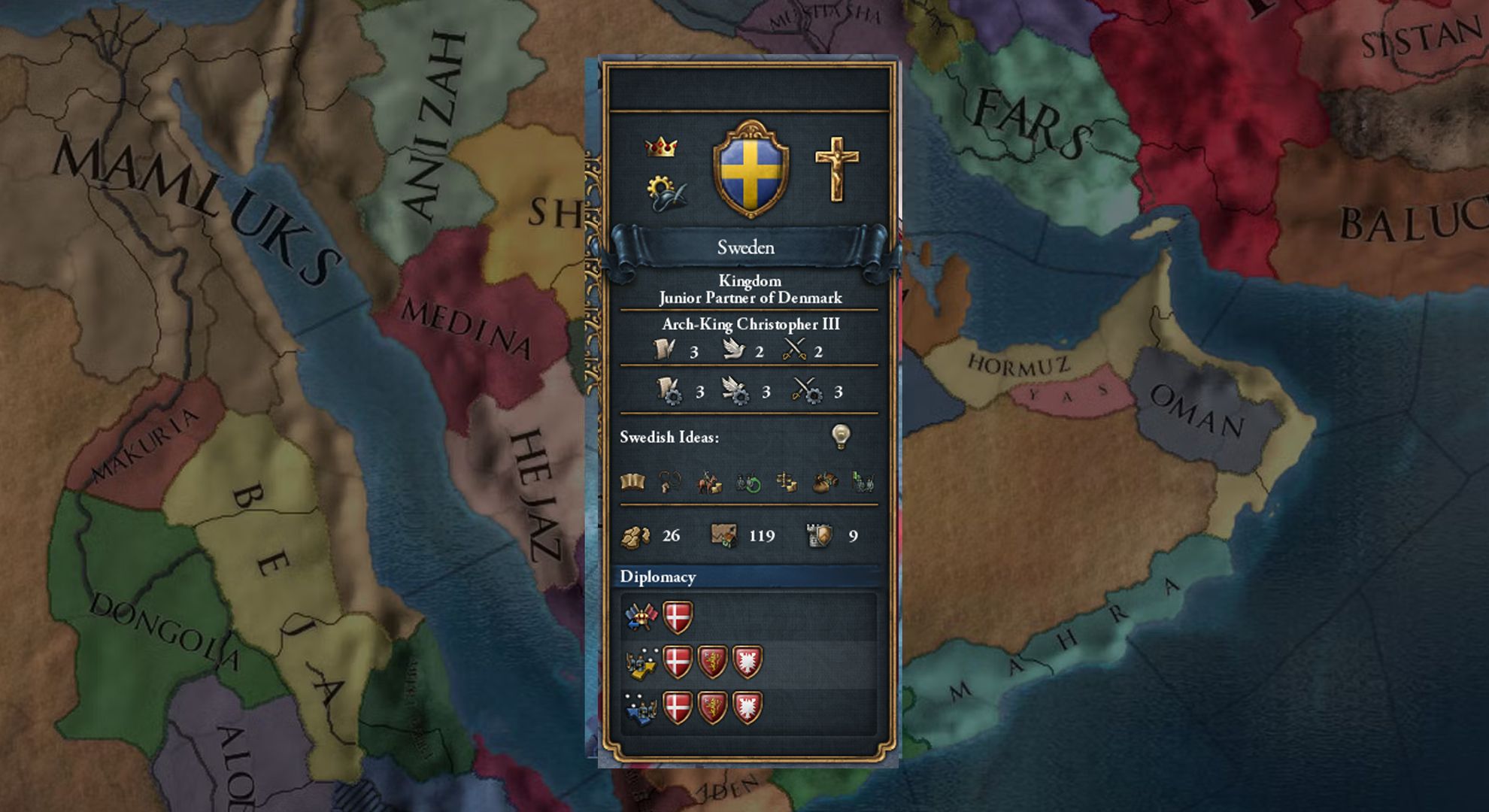
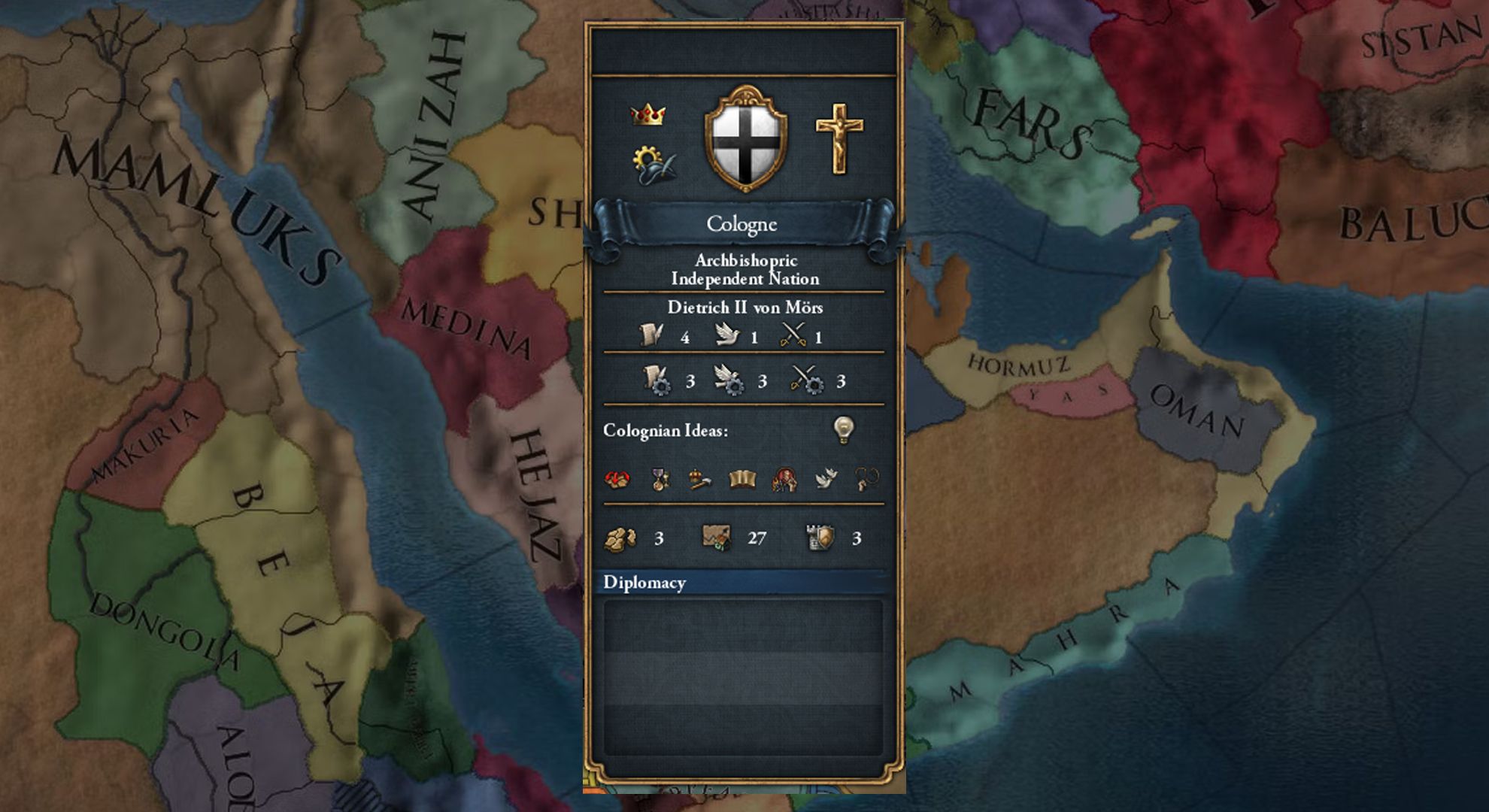
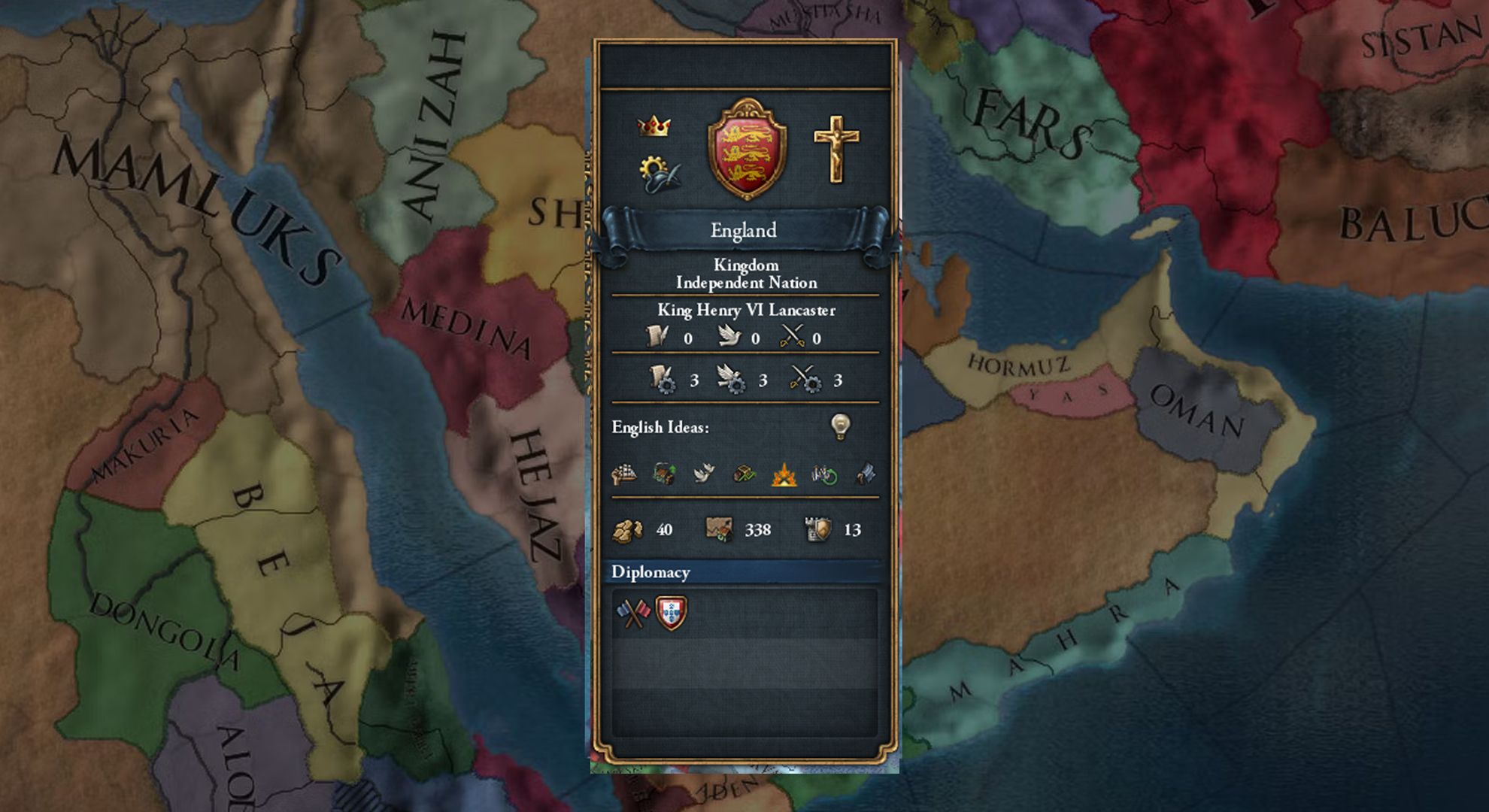
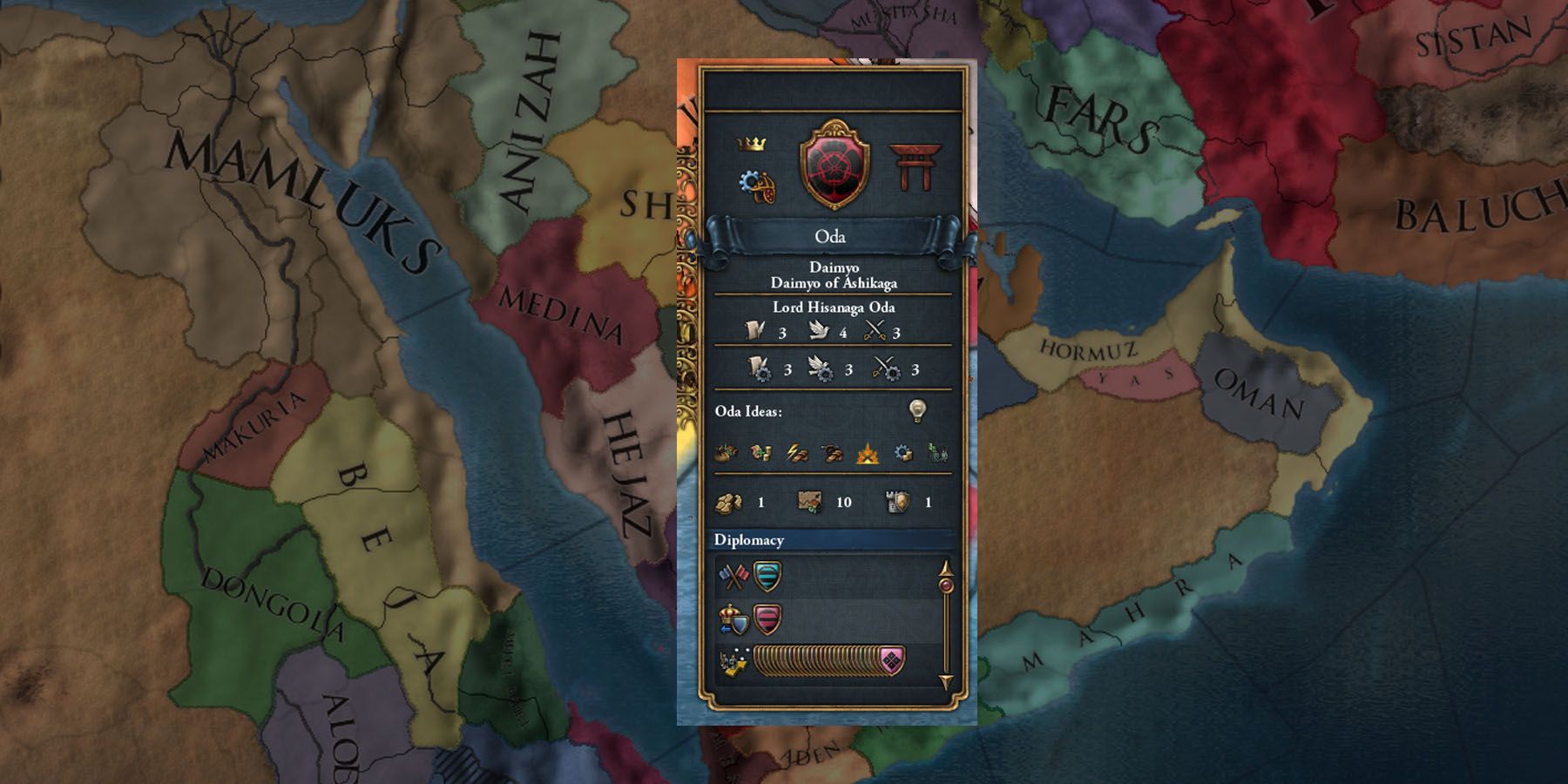
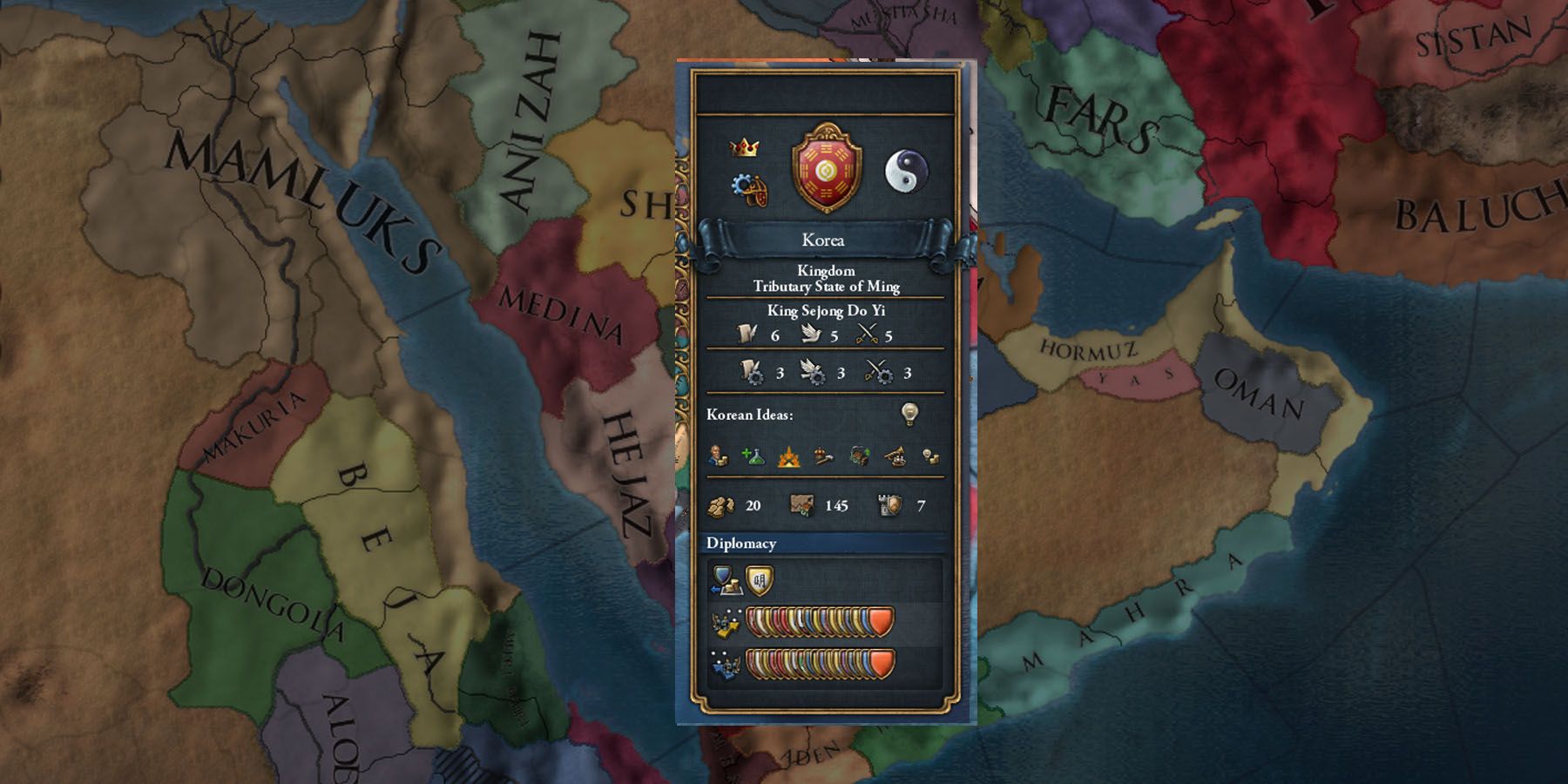
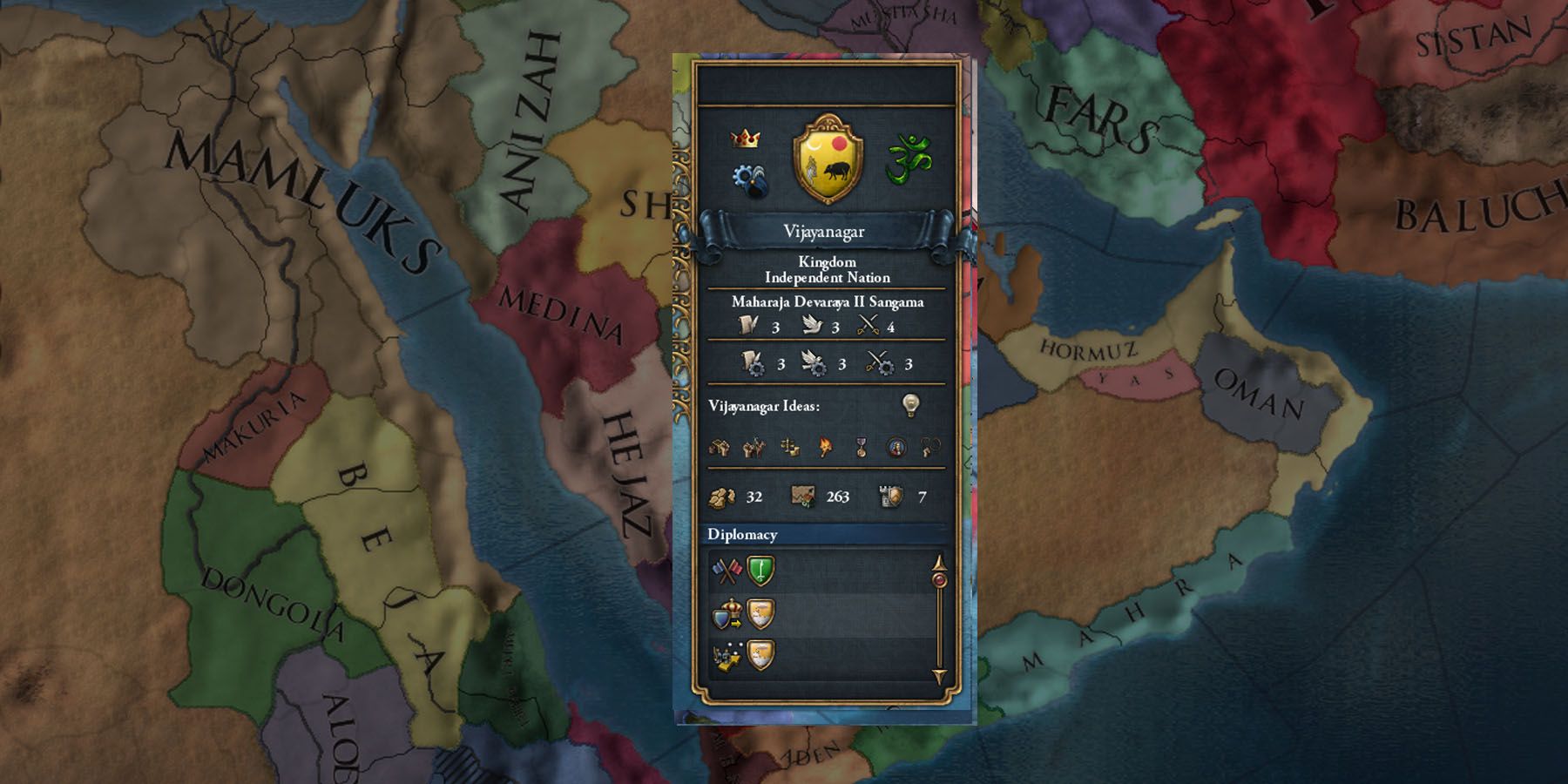
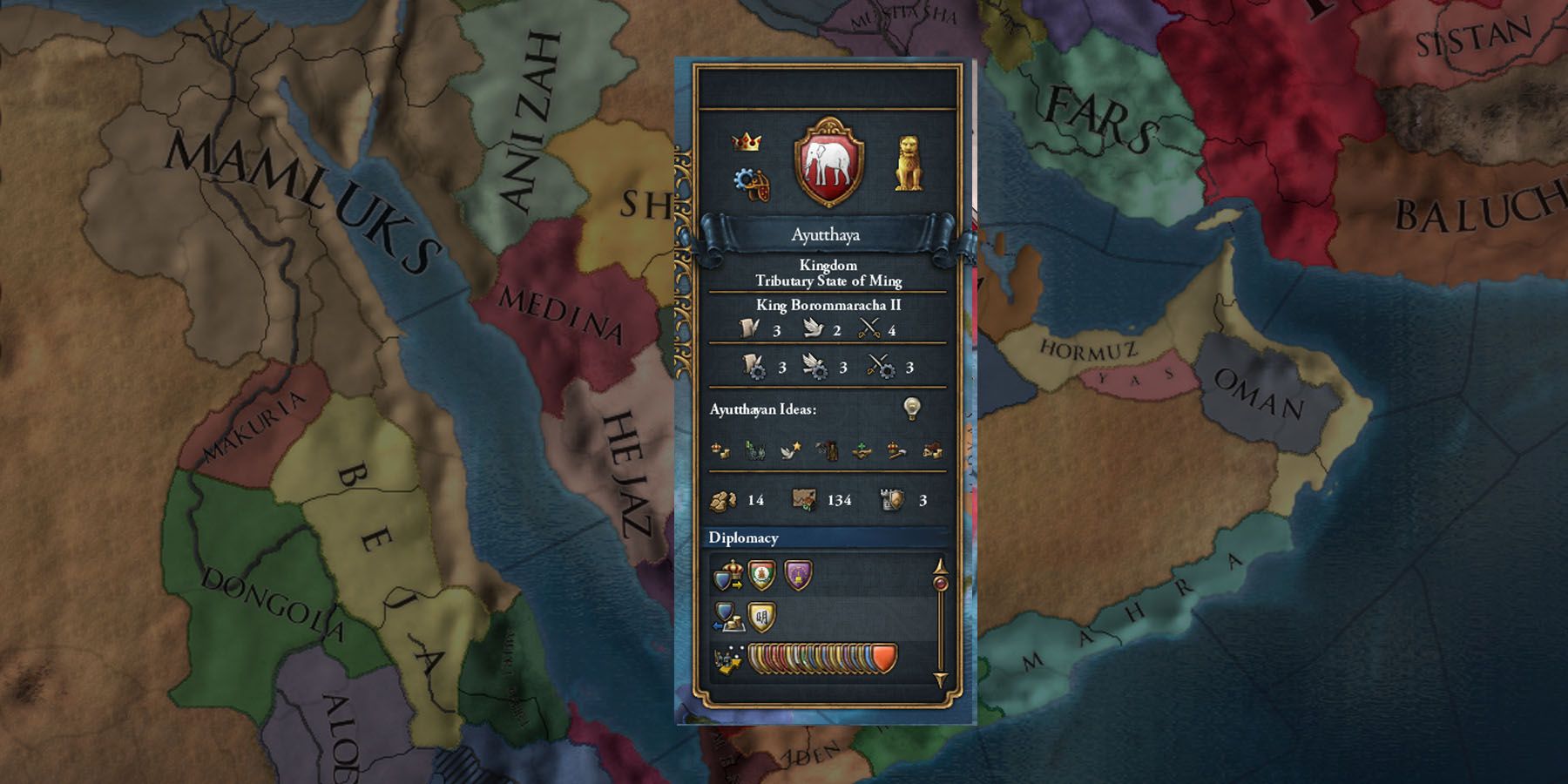
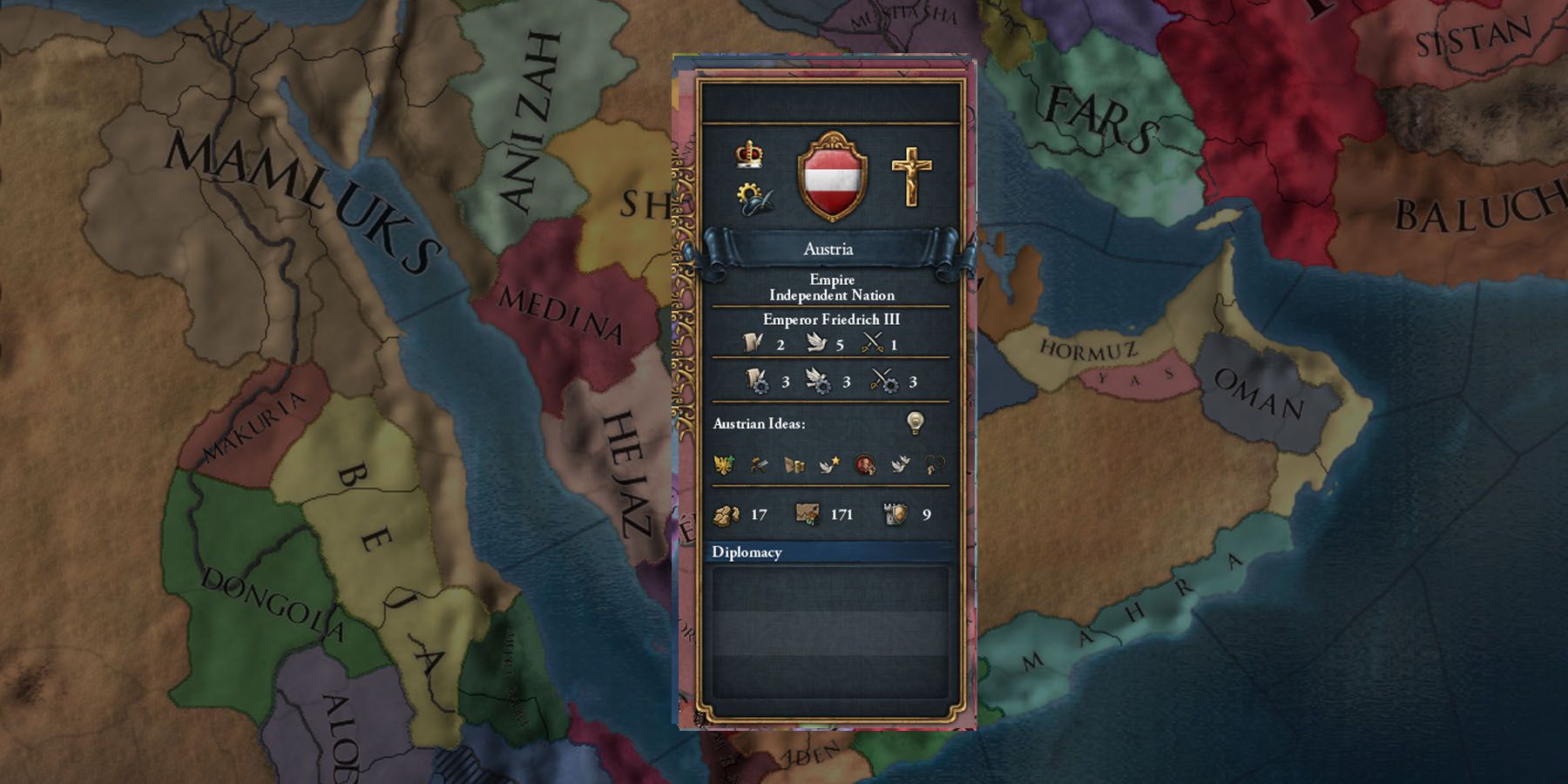
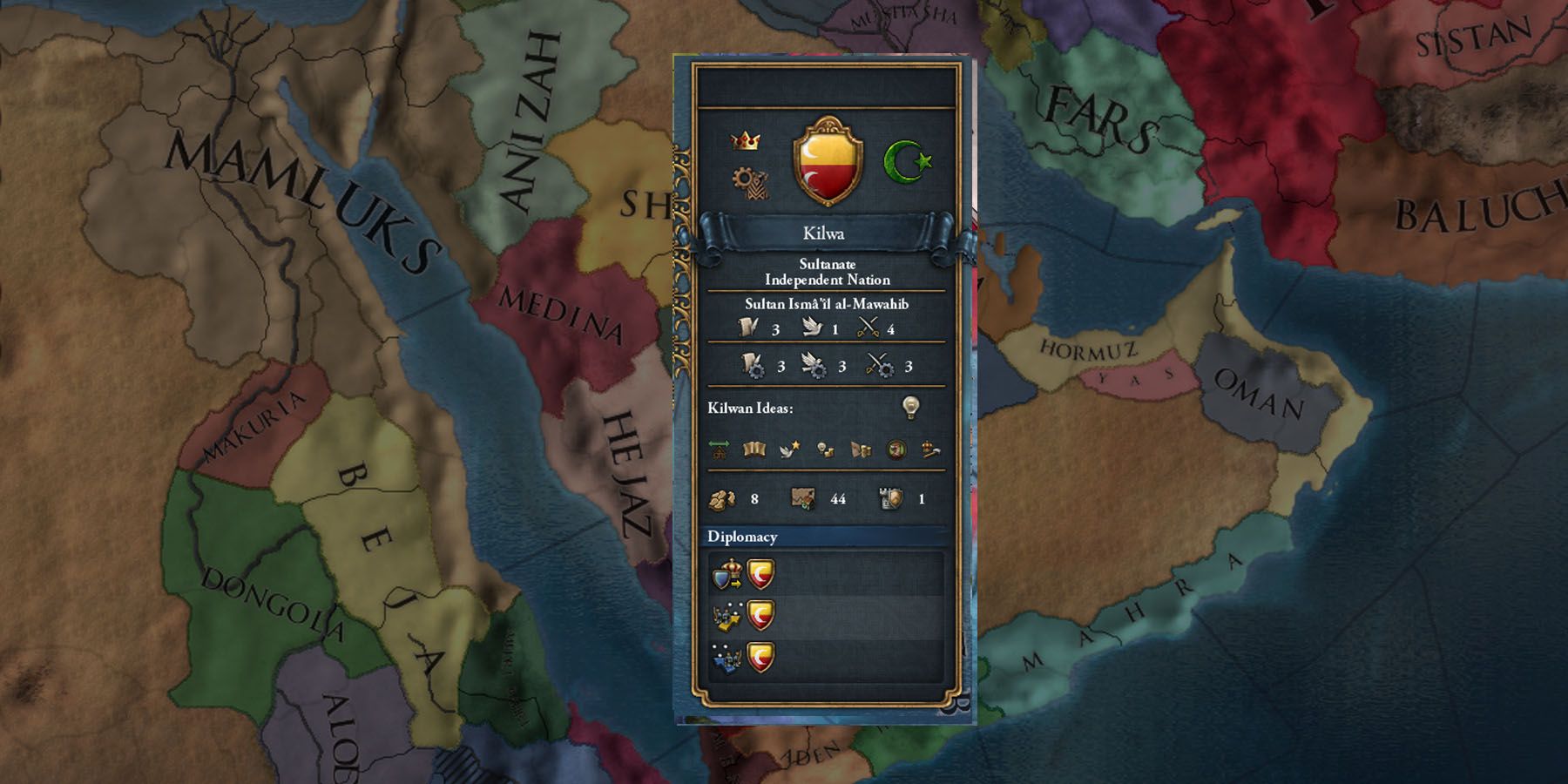
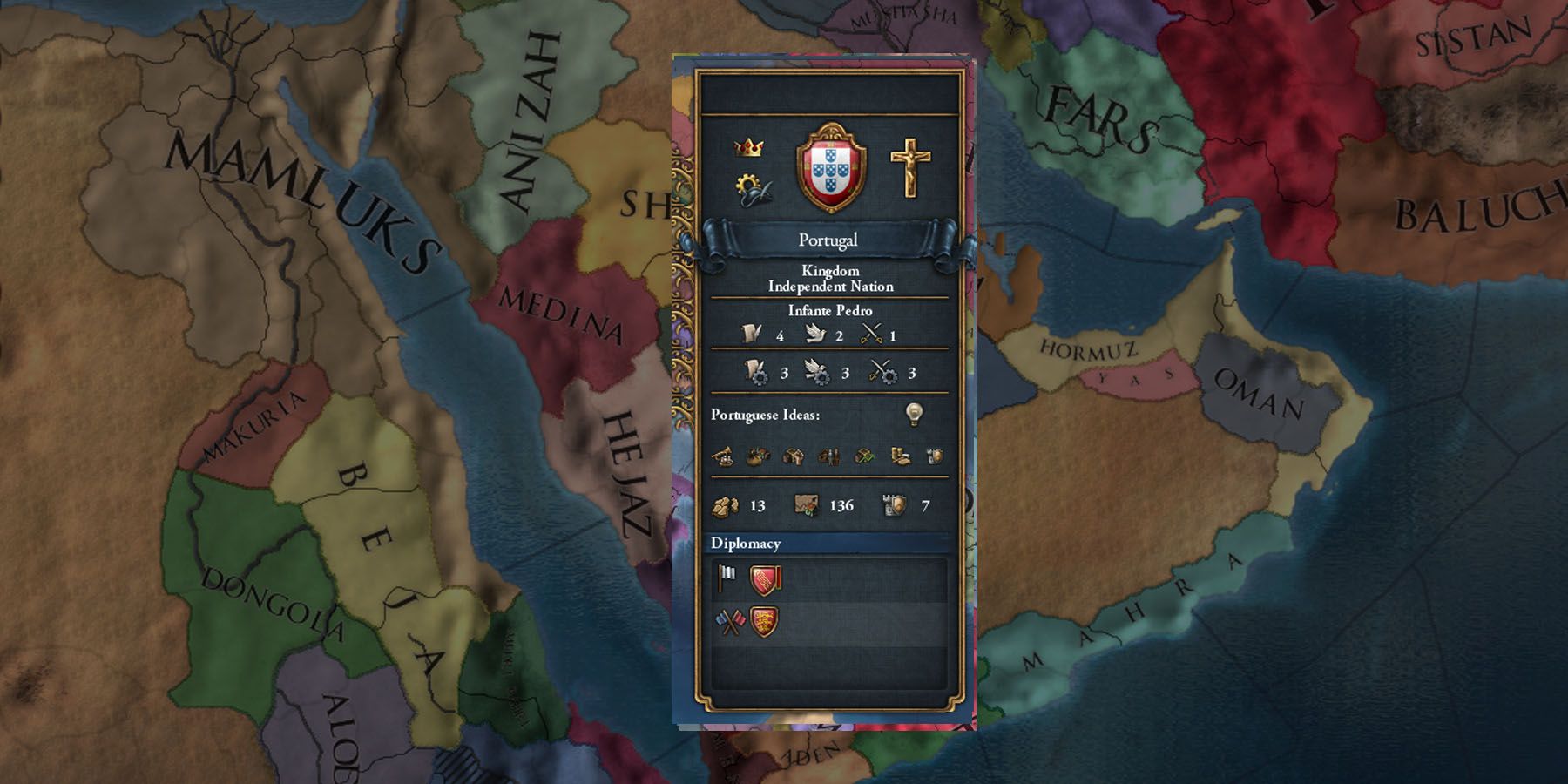
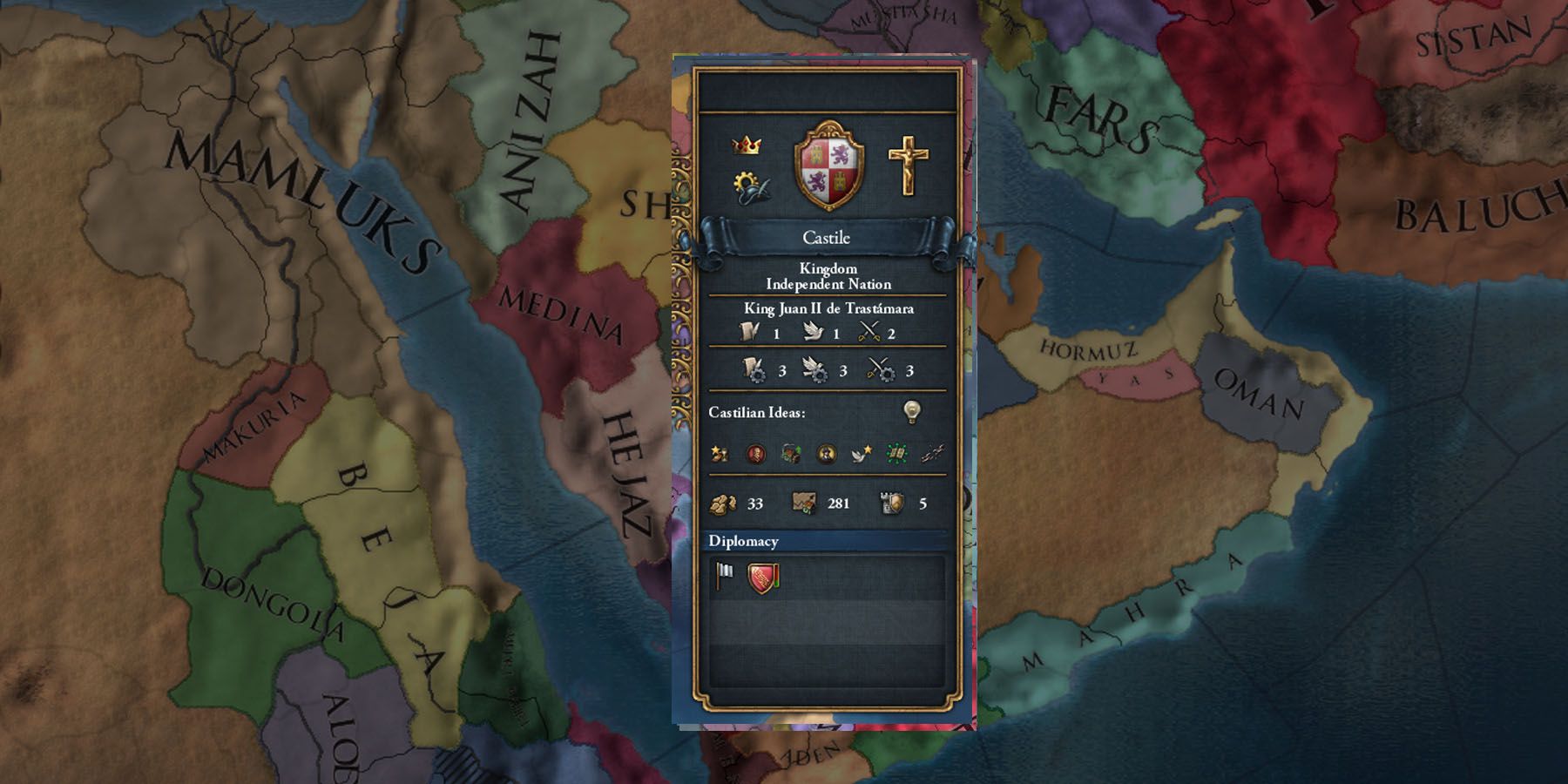
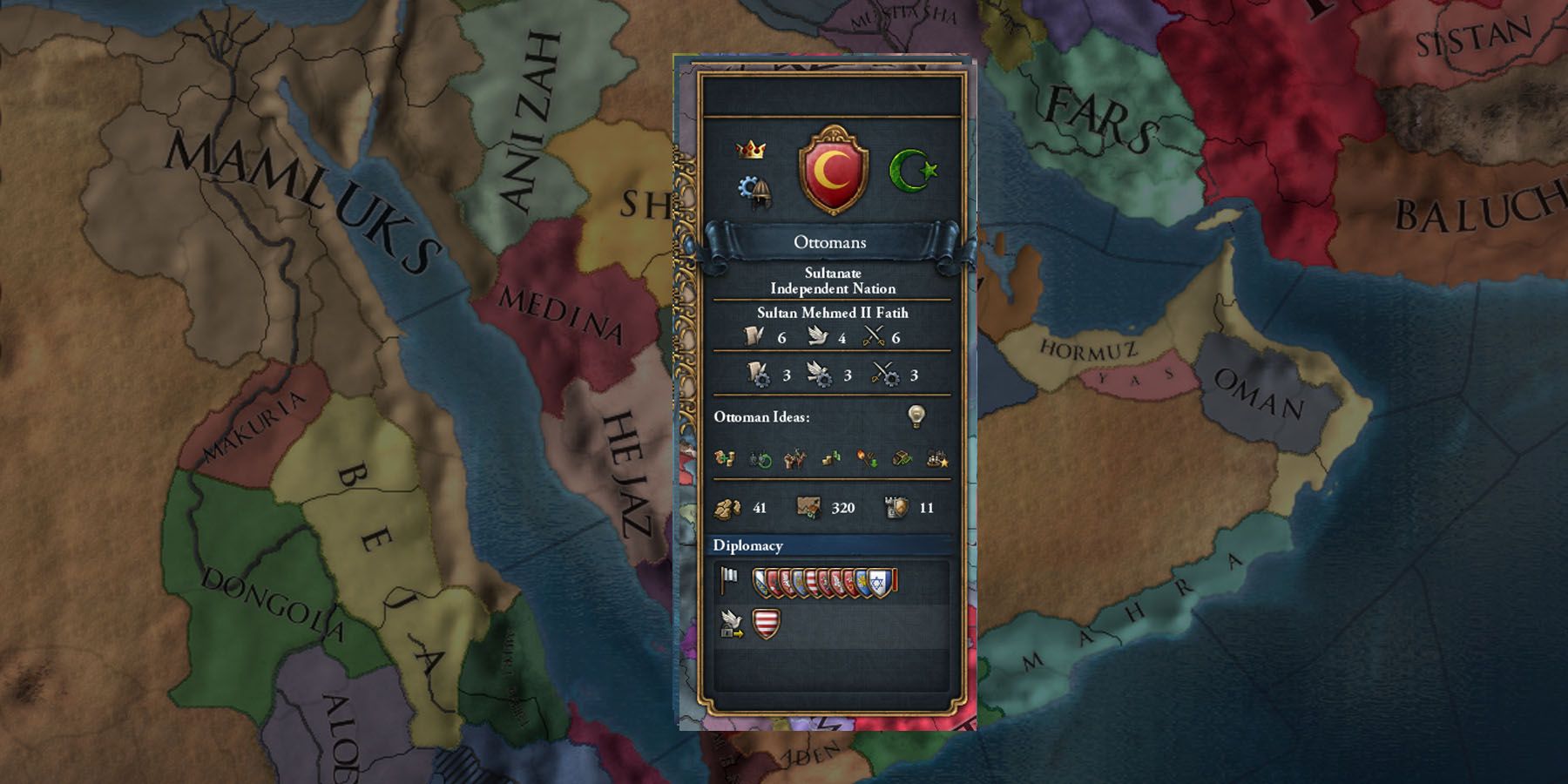
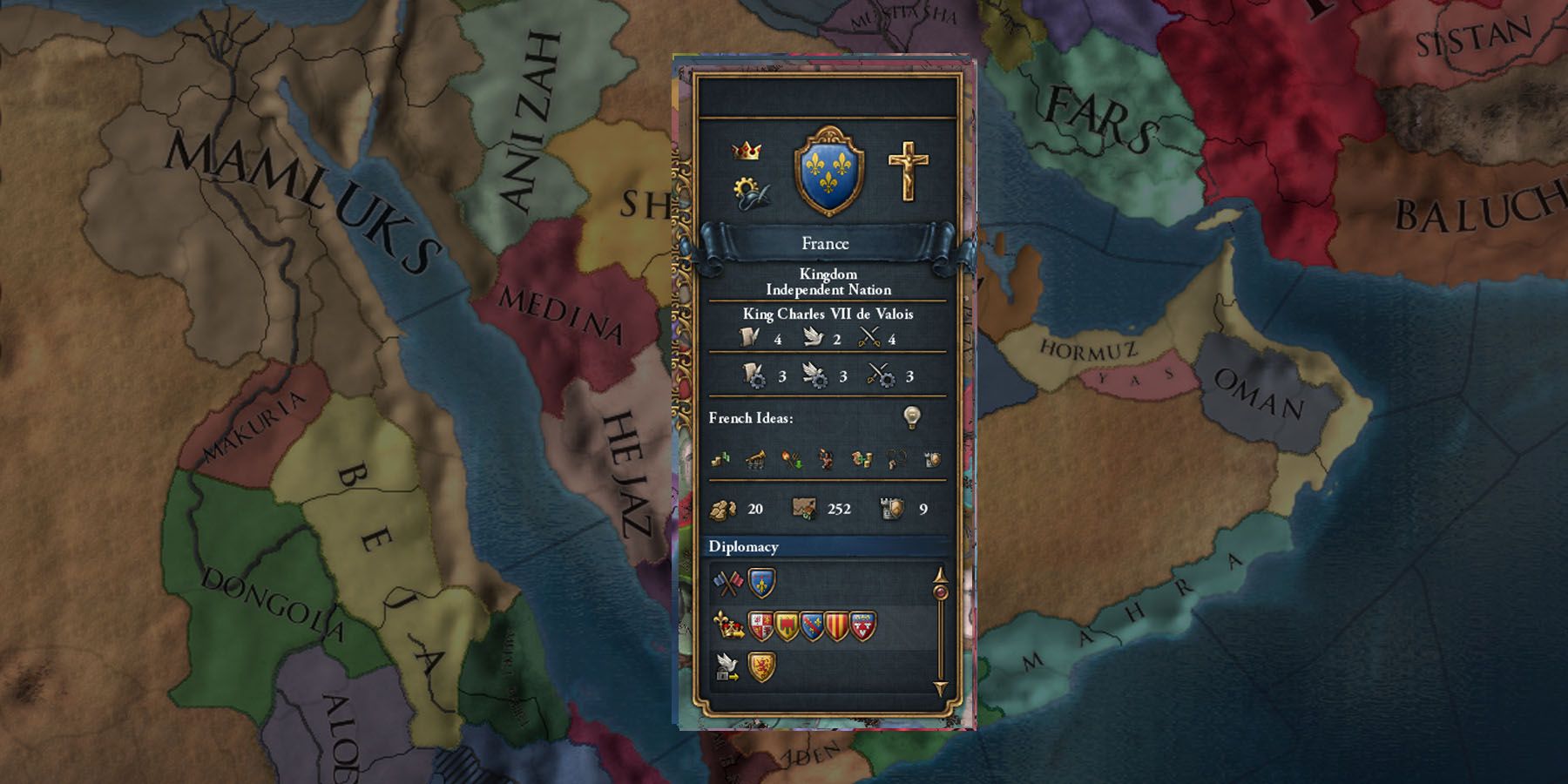










Leave a Reply